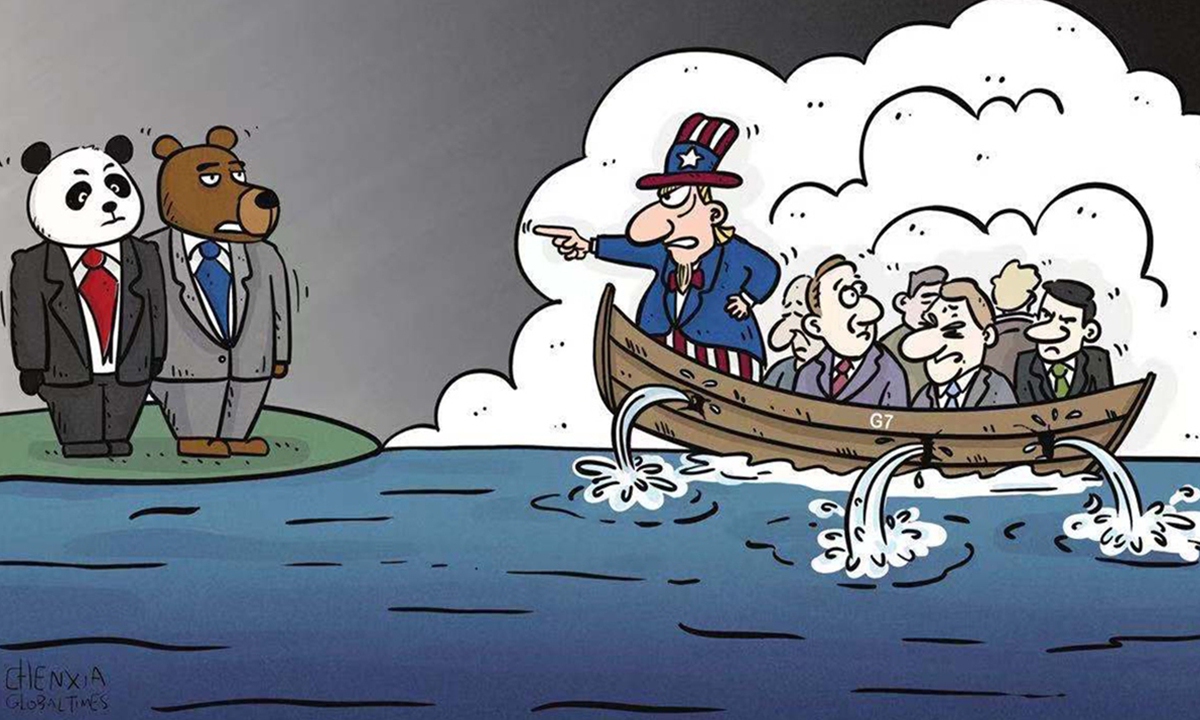
Illustration: Chen Xia/Global Times
As the US is engaging in strategic confrontation with Russia and China, its allies and partners are feeling increasing pressure. Against the backdrop of the Russia-Ukraine conflict, many European leaders are dissatisfied with US' energy prices and discriminatory subsidies against Europe, and some EU member states have called for the lifting or gradual lifting of the sanctions against Russia. In the Asia-Pacific region, many US allies and partners are actively developing relations with China, unwilling to take sides between China and the US. Why has the US' appeal to its allies and partners declined?The US became the sole superpower after the Cold War, promoting a unipolar world led by itself. Based on such a concept, the US has actively intervened in global affairs and wooed allies to suppress Russia and China, aiming at consolidating its global hegemony at all costs.
Russia has abundant resources and powerful nuclear capabilities. After being fooled by Western countries, Russia has given up its illusions about the West. It has intensified its efforts to counter the West and NATO in its surrounding areas.
China is a latecomer on the contemporary international stage. China's continuous and rapid development has improved its comprehensive strength and international influence.
The Biden administration has continued the Trump administration's strategic understanding of China. It believes Russia poses a direct threat to the Western-dominated international system, while China is the only country that has the intention and capability of challenging the international system entirely. Thus, the US regards China and Russia as its main rivals.
However, both China and Russia are major powers with strong comprehensive national strength. For US allies and partners, whether to jointly confront China or Russia depends not only on three motivations, but also on potential costs.
The first motivation is the values advocated by the US and Western countries. Values belong to the category of soft power, and can influence a country's public opinion and foreign policy to a certain extent. But when facing absolute power gap or the risk of serious losses, rational decision-makers do not act solely based on values. Hungary has called ending the sanctions against Russia, and the Netherlands has announced the lifting of dozens of sanctions against Russia.
The second motivation is the US' pressure on its allies and partners. To achieve its goal of confronting China and Russia, the US has often lobbied its allies and partners to join it, and has even put pressure on security protection, economic policy, trade relations and other aspects. In this regard, most of the US allies do not have much ability to counter Washington. They can only submit to the US or follow suit. However, this will inevitably lead to their growing dissatisfaction with the US.
The third motivation is the profits gained by cooperating with US policies, which is mainly reflected in security and economy. In terms of security, the US has strengthened its protection of allies by stationing troops, selling weapons and deploying armaments. This is attractive to some US allies and partners. But in the field of economics, the US is unable to provide allies and partners with the benefits they expect, because it lacks sufficient funds due to the domestic economic downturn and its global planning.
Former Australian prime minister Kevin Rudd recently said that the US should stop throwing allies "under a bus," and economics is the missing element in US grand strategy. In his opinion, "you cannot continue to assume that there'll be collective solidarity on security questions but, on the economy, the United States is happy to throw some of its allies under a bus."
In addition, the costs of confronting China and Russia are enormous. On the one hand, China is the largest trading partner of most Asia-Pacific countries, including some US allies and partners. In economic and security fields, they cannot benefit from confronting China. Just the opposite, they may face a risk of serious losses.
On the other hand, Russia is also a global military power. It has international say on important materials such as energy, minerals, food and chemical fertilizers. European countries that stand with the US have already tasted the bitterness of confronting Russia, and the EU has become the party that has lost the most in the Russia-Ukraine conflict.
The risks of confronting global powers like China and Russia outweigh the benefits. This is the fundamental reason why many US allies and partners are unwilling to follow US completely. According to Stephen Wertheim, a senior fellow at the Carnegie Endowment for International Peace, "overstretched US foreign policy raises risks for Washington and its allies" and "the US and its allies should aim for balances of power, not overmatching power."
The author is an associate research fellow with the National Institute of International Strategy at the Chinese Academy of Social Sciences. opinion@globaltimes.com.cn
